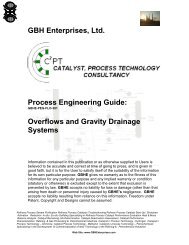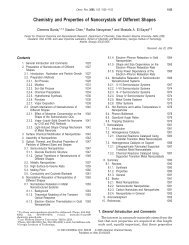Vulcan Series Chloride Removal Technology VGP CRT 2000 and ...
Vulcan Series Chloride Removal Technology VGP CRT 2000 and ...
Vulcan Series Chloride Removal Technology VGP CRT 2000 and ...
You also want an ePaper? Increase the reach of your titles
YUMPU automatically turns print PDFs into web optimized ePapers that Google loves.
HCl Transformation occurs when HCl inlet a chloride removal bed is transformed to<br />
organic chlorides or into chloride salts which are not retained by the bed <strong>and</strong> flow out with<br />
the carrier stream. This occurs over acidic alumina sites <strong>and</strong> the process is accelerated<br />
in the presence of adsorbed HCl, adsorbed water <strong>and</strong> unsaturates (please see section D<br />
on by-product formation overleaf). There is evidence to suggest the organic chloride<br />
formation occurs in the top layers (down flow mode) of alumina beds. The entire organic<br />
chloride reaction front has been observed to be contained in as little as 0.5 meters depth.<br />
Adsorbed HCl on the alumina surface appears to initiate organic chloride formation <strong>and</strong><br />
this involves all of the HCl entering the reactor. Organic chlorides are difficult to detect<br />
<strong>and</strong> frequently lead to the false assumption that HCl is being removed <strong>and</strong> retained by<br />
the alumina bed on line.<br />
4.4 BY-PRODUCT FORMATION<br />
The <strong>Vulcan</strong> <strong>Series</strong> - <strong>VGP</strong> <strong>CRT</strong> <strong>2000</strong>/3000 are not adsorbents but are true catalyst.<br />
They have been specifically manufactured to a low surface area <strong>and</strong> its constituent<br />
materials (a proprietary doubly promoted <strong>and</strong> highly porous ceramic support) do not have<br />
adsorption properties. HCl therefore does not exist freely or in an adsorbed or in a<br />
partially dissociated state inside the catalyst or on its surface. <strong>VGP</strong> <strong>CRT</strong> <strong>2000</strong>/3000 is<br />
not acidic <strong>and</strong> greatly minimizes organic chloride synthesis or<br />
condensation/polymerization reactions.<br />
Alumina Side Reactions<br />
Alumina itself is slightly acidic in nature because of its ability to donate protons its surface<br />
hydroxyl groups. Once it has adsorbed hydrogen chloride its surface acidity is increased<br />
dramatically <strong>and</strong> this acidity can cause undesirable side reactions to occur in the process<br />
stream:<br />
a) In normal operation there will be small traces of unsaturates in the reformer<br />
reactor product, which will go into both the offgas <strong>and</strong> reformate streams. For<br />
example in hydrogen gas ex catalytic reformers the concentration of unsaturates<br />
varies from 400 ppmv to 1000 ppmv. These unsaturates will react with hydrogen<br />
chloride when promoted by an acid catalyst. Thus organic chlorides can be<br />
formed across the alumina bed. These organic chlorides are not removed by the<br />
alumina <strong>and</strong> will slip from the bed into the product stream. If the offgas stream<br />
goes to hydrotreating or hydrocracking units these organic chlorides will be<br />
hydrogenated to HCl <strong>and</strong> will then cause corrosion problems <strong>and</strong> may also<br />
deactivate the hydroprocessing catalyst.<br />
Refinery Process Stream Purification Refinery Process Catalysts Troubleshooting Refinery Process Catalyst Start-Up / Shutdown<br />
Activation Reduction In-situ Ex-situ Sulfiding Specializing in Refinery Process Catalyst Performance Evaluation Heat & Mass<br />
Balance Analysis Catalyst Remaining Life Determination Catalyst Deactivation Assessment Catalyst Performance<br />
Characterization Refining & Gas Processing & Petrochemical Industries Catalysts / Process <strong>Technology</strong> - Hydrogen Catalysts /<br />
Process <strong>Technology</strong> - Ammonia Catalyst / Process <strong>Technology</strong> - Methanol Catalysts / process <strong>Technology</strong> – Petrochemicals<br />
Specializing in the Development & Commercialization of New <strong>Technology</strong> in the Refining & Petrochemical Industries<br />
Web Site: www.GBHEnterprises.com








